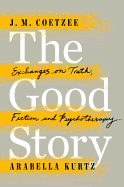
In his novels, J.M. Coetzee (The Childhood of Jesus) regularly explores how characters might invent and reinvent themselves in their social classes, their politics and their religions. With The Good Story: Exchanges on Truth, Fiction and Psychotherapy, Coetzee has decided to lift the curtain of fiction and attack questions of identity head on.
Through transcribed conversations with noted clinical psychologist Arabella Kurtz, the two begin to piece together an argument for fiction's place in the human psyche. Coetzee turns the tables on himself and asks of Kurtz whether or not everyone--award-winning novelist or not--is a writer of fiction. What starts as Coetzee corresponding with a friend about his own interest in using psychology to build characters quickly expands to include long-debated theoretical concepts.
A patient will see a therapist like Kurtz, Coetzee says, with deeply held ideas about themselves. Is it the job of the therapist to reveal their self-deceptions or to validate them? Is objective truth even possible if memory is so faulty?
"My inclination," Coetzee writes to Kurtz, "is to regard the stories that artists tell about themselves as much like the stories the rest of us tell about ourselves: they serve our own interests." Kurtz responds, "The stories we tell about our lives may not be an accurate reflection of what really happened, indeed they may be more remarkable for their inaccuracies than anything else.... But they are simply all we have to work with."
In the course of the book, the two giants of their respective field leave no stone unturned when it comes to fiction, psychology and philosophy. --Josh Potter

